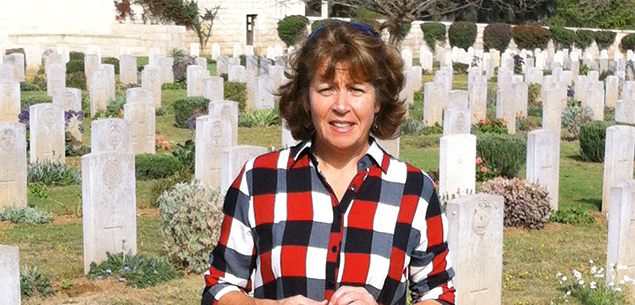“I’m a 52-year-old mother of two, originally from Levin, with a background in nursing.
I work in Gaza as an aid worker for the Red Cross, alongside the Palestine Red Crescent Society, to provide emergency medical and relief services to wounded citizens.
I also ensure hospitals and ambulances are safe and well supplied, and I make sure nurses, doctors and ambulance staff can do their jobs during situations of violence.
Medical assistance is a fundamental right for innocent civilians who are not directly involved in combat, and that needs to be protected.
Before I became an aid worker, I spent many years as a neonatal nurse in intensive care units at hospitals in Christchurch and Wellington.
However, I had wanted to work for the Red Cross for a long time, because they assist people who live in very tough environments.

Gail has worked for the Red Cross since 2010.
I began working for them in 2010. It was the perfect time in my life to follow this path as I had finished my Masters in nursing, my son and daughter were grown up and independent, and I wasn’t married so I had the chance to explore new directions.
I’ve been in Gaza for 19 months now, after working in Iraq and then Afghanistan.
During the past month, the situation here has reached a whole new level of intensity. This is the third war between the Israelis and the Palestinians in six years. Previously there were air strikes and rockets, but this time there’s a ground incursion, and there is closer fighting on both sides. This conflict is worse than any war zone that I have worked in before.
Recently, I travelled with an ambulance team to a heavily shelled area, where I helped pull people out of the rubble and treated the wounded.
I’ve also visited many hospitals that have been bombed. There were a lot of deaths, a lot of bodies.
For the local people, their priority is to bury the dead very quickly, but our priority is to help the wounded and get the women and children out.
The number of people trying to get into hospitals has skyrocketed and has put a strain on our resources.
I don’t feel unsafe doing my job, as we work in negotiated windows of time where combatants are meant to stop firing. Our team does a lot of talking to both parties of the conflict, making sure that everyone can do what they need to within windows of ceasefire.

Gail says the number of people trying to get into hospitals has skyrocketed and put a strain on resources.
Keeping busy is the best coping mechanism for me, especially with everything that you see in a place like this. You’ve got to put it in a box and deal with the immediate situation.
I speak to my family every day, including my mother, who lives in Levin, via Skype. Being in contact with loved ones helps to keep me going. They’re not happy about me being here, but I assure them that I’m safety conscious and not running into dangerous situations willy nilly.
I do get homesick, but there’s a lot of work to be done here. My family knows that this is the career I have chosen, and they respect that.”
As told to Aroha Awarau

